Poetic Justice

by Robin Rose Graves
Star Trek has often been uninspiring of late — but this episode reminded me why I keep watching week to week.
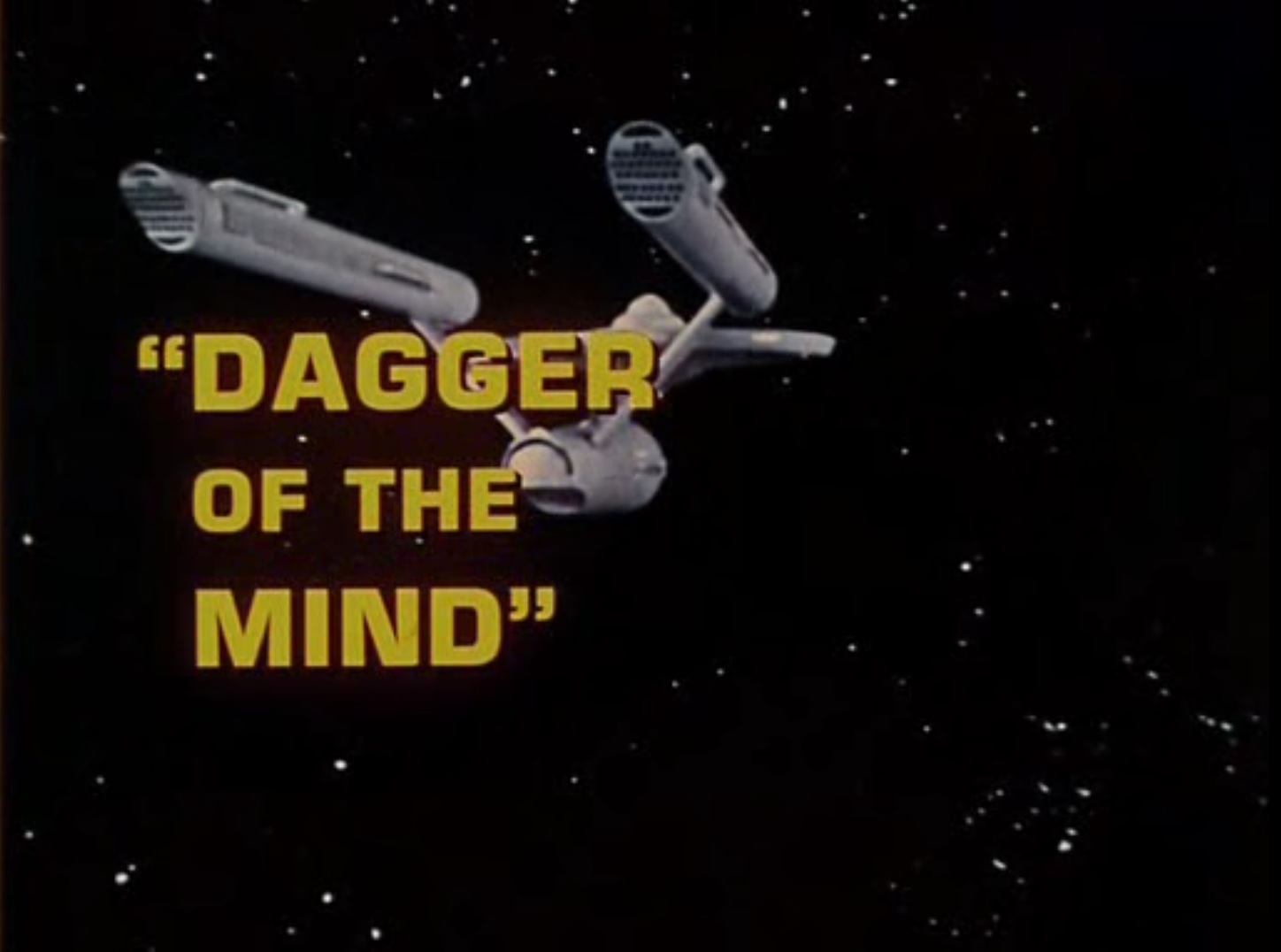
The opening scene is unassuming. The Enterprise fails to transmit a delivery to the planet Tantalus. Kirk calmly reminds the transporter operator that prison colonies such as Tantalus are equipped with force fields. After receiving the needed permission from the planet, the delivery is allowed to go through, and in return, the Enterprise receives a mysterious box labeled “Do Not Open” (as if viewers don’t already have a good idea of what could possibly be inside).
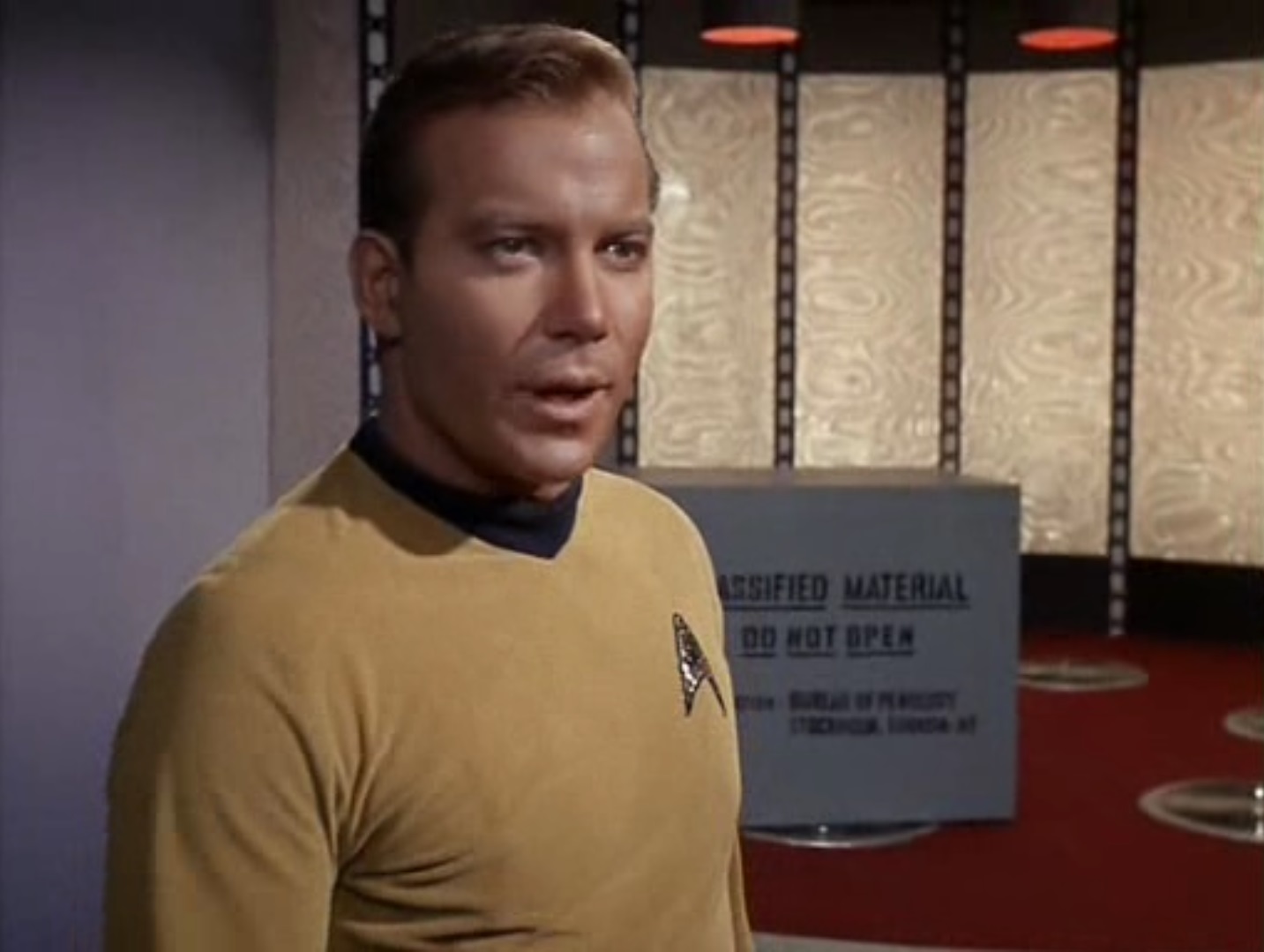
"Under no circumstances are you to open this, you hear?"
Tantalus informs the Enterprise that a person is missing and could pose a danger to the crew. Unsurprisingly, the box housed the runaway. Now loose on the Enterprise, he becomes aggressive upon being discovered. He asks for asylum on the ship while holding Kirk at gunpoint. Spock subdues the man, and the Enterprise informs Dr. Adams on Tantalus that they found their runaway. Said fugitive identifies himself (with much pain and difficulty) as Dr. Simon van Gelder. A computer check reveals that he is not actually an inmate, but rather Dr. Adams’ assistant. It is at this point my interest was piqued. Why is an assistant being treated like an inmate? What led him to acting like the wild man he is now?
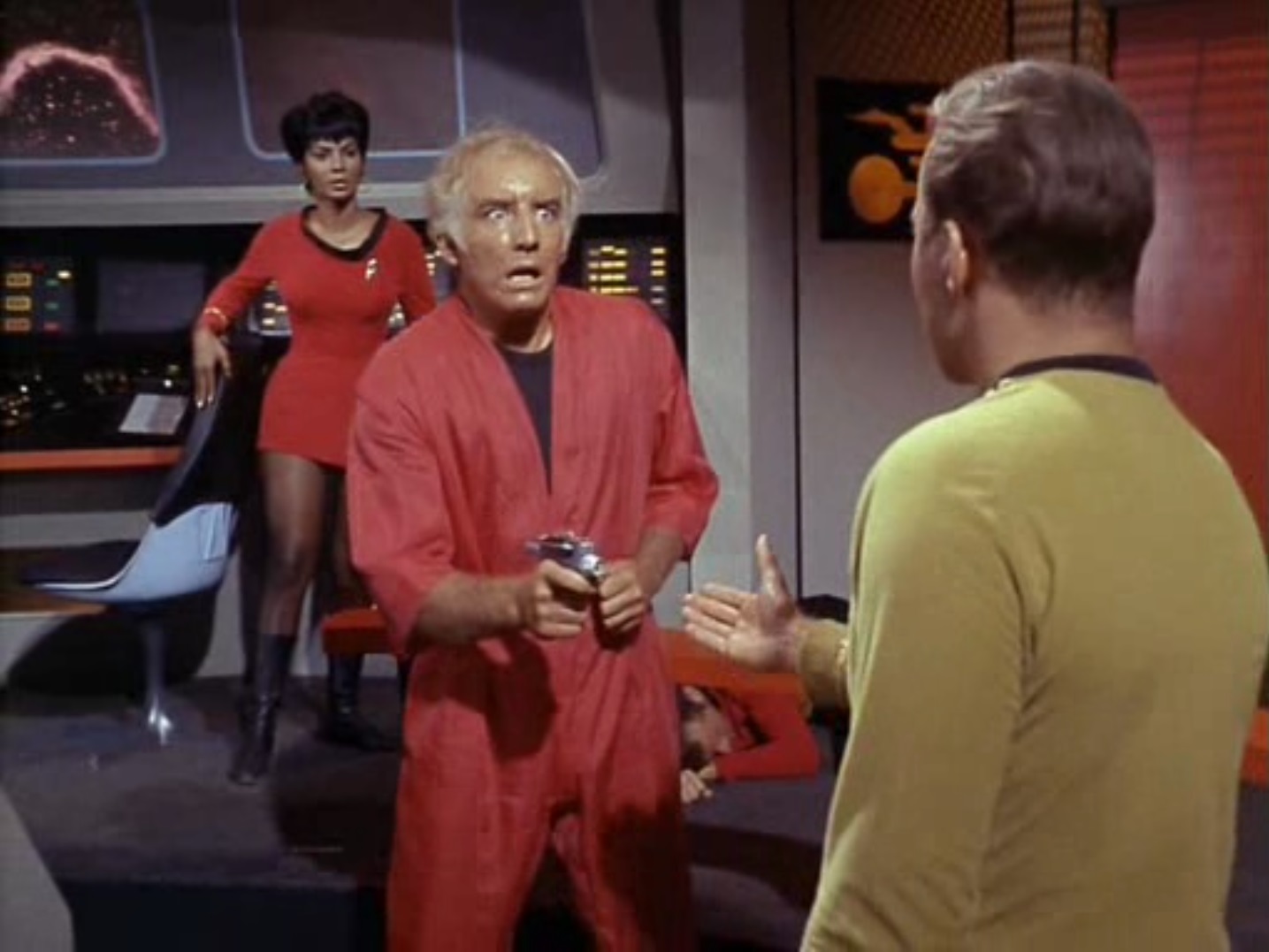
Van Gelder remains on the Enterprise while Kirk beams down along with the Enterprise’s psychiatrist – Dr. Helen Noël – in order to investigate Tantalus. They are immediately met by Dr. Adams and welcomed to the colony. Dr. Adams has gained celebrity for his humane rehabilitation methods on inmates. While on tour, Kirk and Dr. Noël encounter several reformed inmates, now acting as employees. Kirk notes their strange emotionless behavior. Dr. Adams shows off a device called the “neural neutralizer”, which he says he uses to calm agitated inmates. He explains that it is harmless at low increments.
Back on the Enterprise, a frantic van Gelder reveals to Spock and McCoy that it was the use of the neural neutralizer that left him in his current state. As Spock presses him further, van Gelder writhes in pain, struggling to speak (the actor’s performance makes it particularly difficult to watch). Finally, McCoy convinces Spock to use an ancient Vulcan psychic technique in order to calm van Gelder and allow him to speak freely about his experiences back on Tantalus.
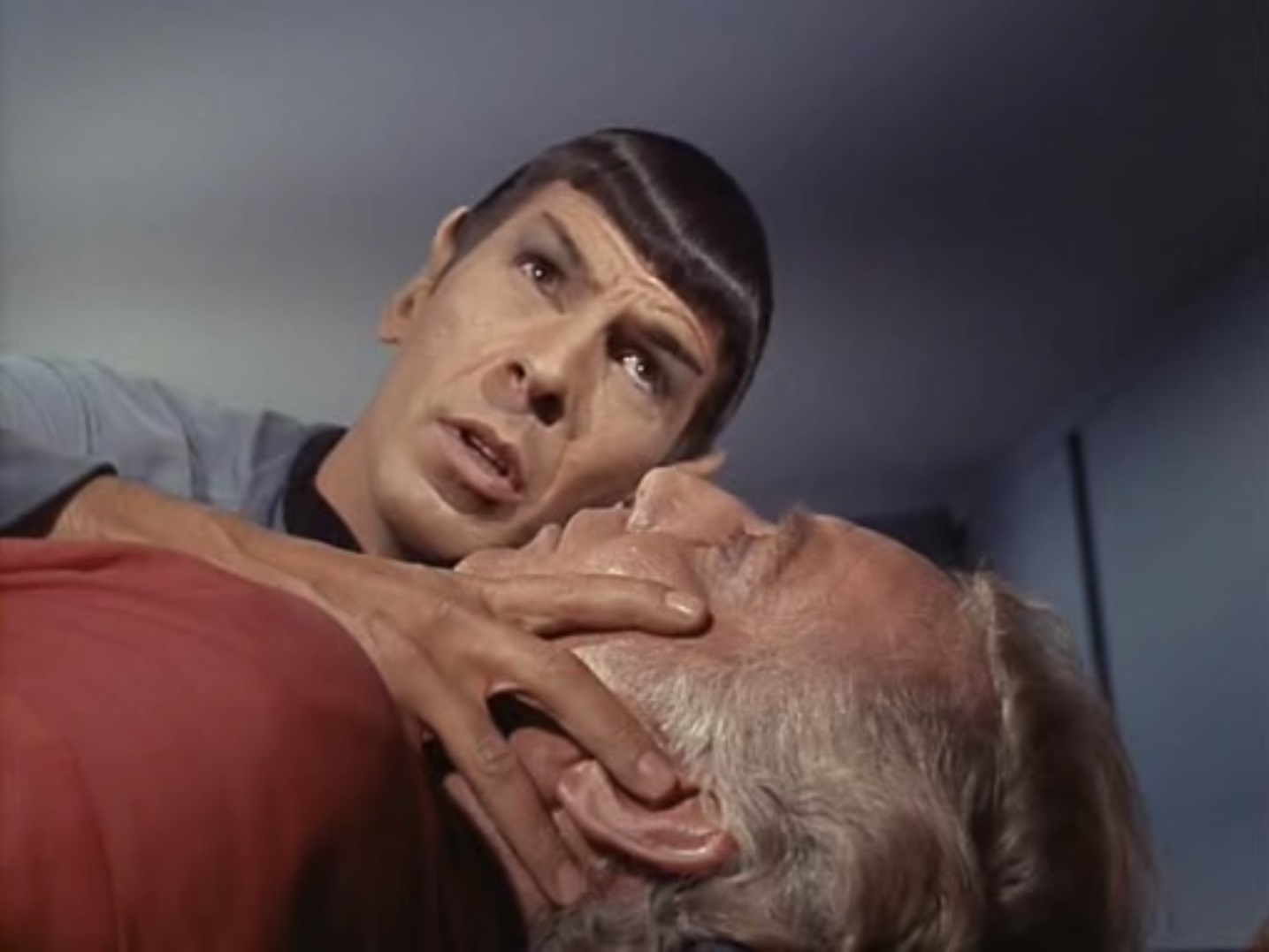
The ancient Vulcan technique introduced in this episode. Remarkable for the intimacy required and the vulnerability displayed.
He explains the true nature of the neural neutralizer: that it empties the mind, leaving those afflicted vulnerable to suggestion, and that Dr. Adams has been using it on inmates and staff to gain control over them. Now understanding the danger Kirk and Dr. Noël are in, the Enterprise attempts to beam down backup, but are unable to because of the colony’s forcefield. They discover all communication with the planet is severed as well.
After voicing his concerns to Dr. Noël, she and Kirk secretly investigate the neural neutralizer. With Dr. Noël at the controls, Kirk volunteers as the test subject. She is able to alter his memory of their first meeting, converting an innocent flirtation into a more serious affair. But while Kirk is under, Dr. Adams takes control of the neutralizer, turning up the intensity. He then forces Kirk to believe he has been in love with Dr. Noël for years and being apart causes him physical pain. He is then released to his quarters along with Dr. Noël, awaiting his next treatment.
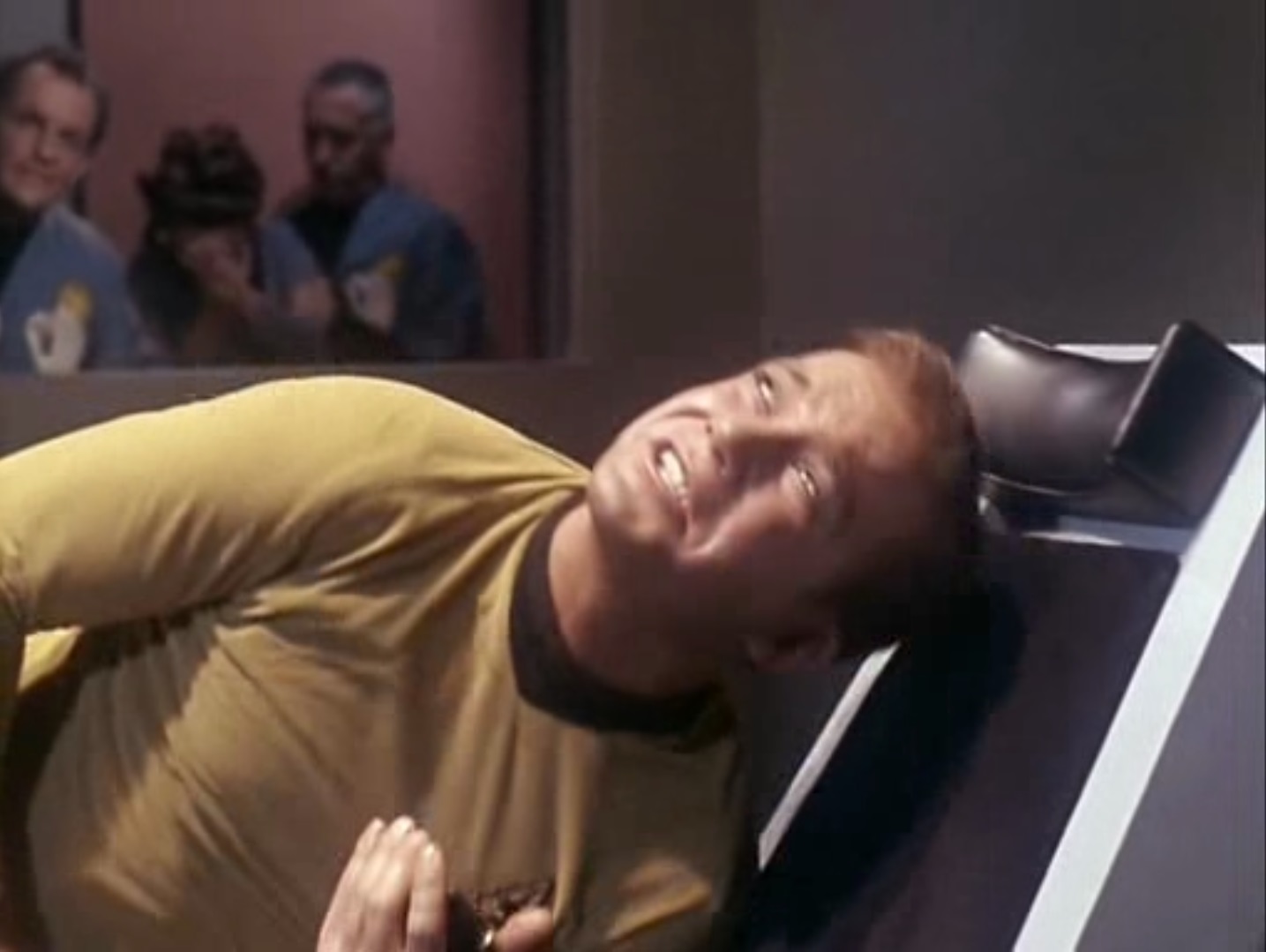
Thankfully, as we saw in Naked Time, Kirk's capacity for love is constrained to the Enterprise, and Adams' conditioning fails to take, at least not to a debilitating level. At Kirk’s suggestion, Dr. Noël escapes the room through a duct. Kirk is collected once again for his next treatment, but Dr. Noël is able to sabotage it by shutting off the power. Kirk fights Dr. Adams and leaves him unconscious in the neural neutralizer. Dr. Noël gets her own action scene when she is discovered and single-handedly takes down the guard. (It’s nice to see female characters do more than look pretty and lust after Captain Kirk). With the power now down, Spock is able to beam down to the planet. He resets the power, which activates the neural neutralizer with Dr. Adams still inside. The neutralizer, without anyone to man the device, empties Dr. Adams' mind entirely, killing him with loneliness. Poetic justice for him to be killed by the same device he had tortured countless people with.
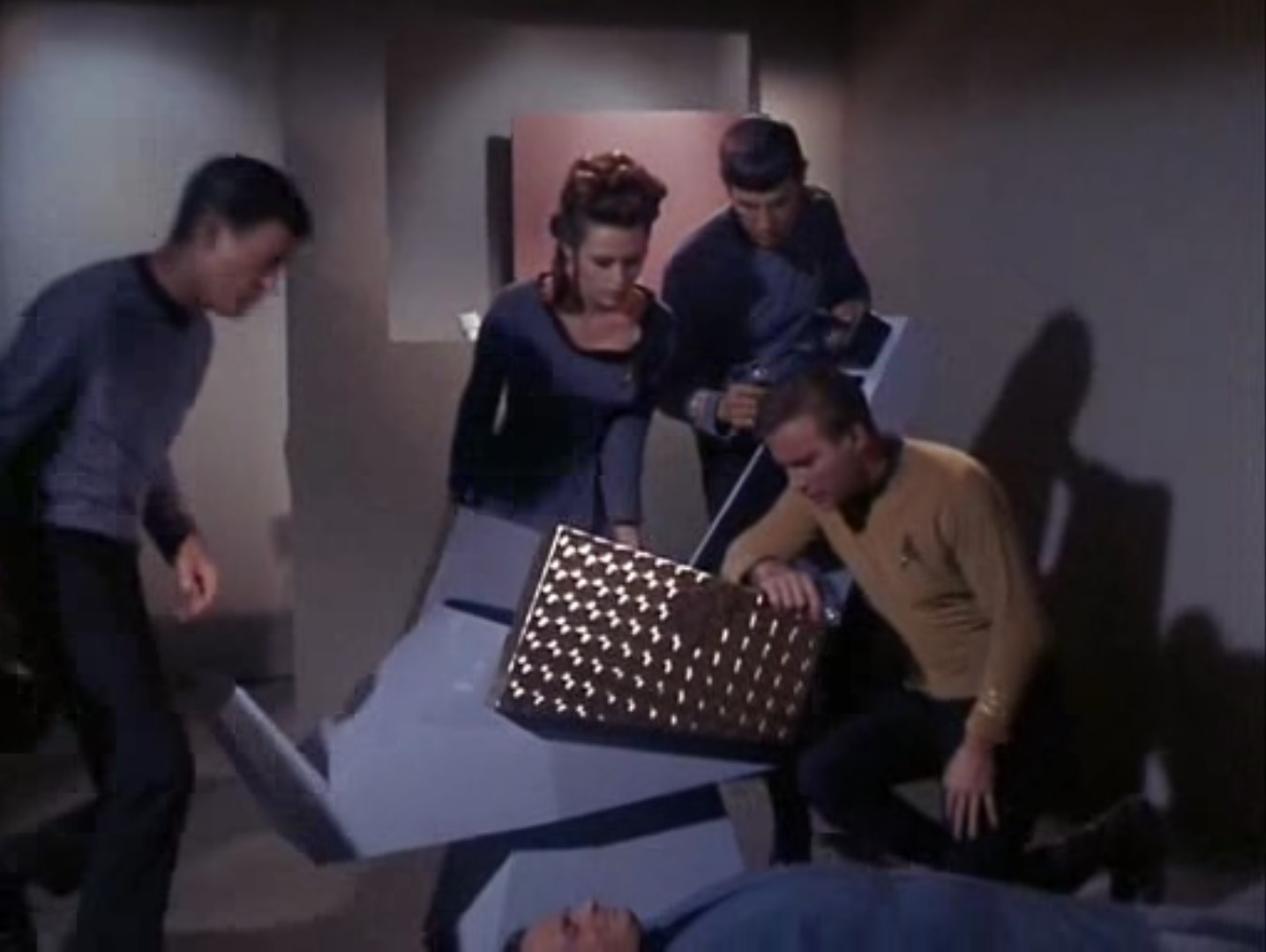
The episode ends with Kirk looking morose. McCoy questions how loneliness is able to kill a human being, but Kirk groks, having experienced the effects of the neural neutralizer himself.
"Dagger" features some of the best performances we’ve seen so far (only matched by Leonard Nimoy’s performance in "Naked Time"). Upon meeting the blank workers of Tantalus, I was alarmed by their listless speech and stoney faces. Morgan Woodward (van Gelder) chokes on every word as he struggles to fight his conditioning through physical pain and speaks of the horrors he has been through at Dr. Adams’ hands (I clenched up in sympathy watching these scenes). So much was relayed on performance alone that no fancy looking technology was needed, and while I love a vivid set design, the comparatively plain look of this episode was fitting, allowing the acting to shine without competition.
This episode earns a five star rating from me.
The Mythopoeia of Star Trek

by Jessica Dickinson Goodman
Nine episodes into Star Trek and we’re beginning to see some of the myths that float just under the surface of this world. J.R.R. Tolkien called this kind myth-making “mythopoeia,” though it has existed for as long as storytellers have called upon “rosy-fingered Dawn” or “the evil Jinn.” The Cage had the Talos star group, named presumably for the ancient greek robot who protected Europa in Crete; Charlie X had the cargo vessel Antares, meaning “rival-to-Mars”; Where No Man Has Gone Before, had crewmember Gary Mitchell reciting “The Nightingale Woman,” which he says was “written by Phineas Tarbolde on the Canopius planet back in 1996.” Canopius is probably a mistranscription of the name of the man who steered the ship of King Menelaus of Sparta to Egypt during the Trojan war. More than just referencing the existing Western mythical names of heavenly bodies, Star Trek layers those stories onto future histories, adding meaning and depth.
When I first heard the name of the penal colony in this week’s episode, I remembered that in Greek mythology, Tantalus is the founder of the House of Atreus, and his story is one of the more gruesome in a genre often marked by gore. Tantalus wanted to test the gods’ omniscience, and so when he was a guest on Mount Olympus he killed his son and served him to the gods as a feast. For killing his child and challenging the gods, Tantalus was sentenced to starve forever in a pool of water with ripe fruit hanging above his head, the water always receding when he bent to drink, and the fruit always raising itself just out of his reach.

Tantalus, by Gioacchino Assereto (1600–1649)
These themes of taboo, hunger, challenging powerful people, consent, hubris, punishment, and abuse of power move throughout Dagger of the Mind. When I saw Captain Kirk writhing in a pool of blue light as he tried to escape torment and artificially implanted lust, it reminded me of that final image of Tantalus in his pool, trapped by forced hunger and cruel punishment.
The parallels are not perfect — Captain Kirk is a victim of Doctors Adams and Noël, not a child-killing cannibal — but mythical references don’t have to be perfectly in-tune to be resonant. They just have to tantalize us into thinking and feeling more deeply about these characters.
Four stars.
Holding out Hope

by Janice L. Newman
This episode was deeply disturbing in many ways. The idea of the erasure of memories, of self, is creepy at best and horrific at worst. It is a kind of death, for who are we without our memories?
Nonetheless, beneath the horror I found a hopeful note. McCoy, when asked if he's visited a penal colony since the Federation began following Dr. Adams' theories, says simply, "A cage is a cage, Jim." Captain Kirk immediately contradicts him, saying that McCoy is behind the times, and that penal colonies are more like "resort colonies" now. Throughout the episode, despite the horror, runs a theme that prisoners should be treated with humanity, and that the purpose of such places is not to punish, but to help.
Furthermore, the prisoners themselves are never portrayed as 'deserving' the torture and the erasure of their minds. No matter what they've done in the past, they are shown as victims of Dr. Adams' machinations. Once it is understood what Dr. Adams is doing, no one other than Adams himself suggests that the prisoners are 'better off' for having part of their mind cut away. Compare this to the practice of lobotomizing people, either 'for their own good' or for 'the good of society'. Performing a lobotomy was outlawed in the Soviet Union in 1950 on the grounds that it is "contrary to the principles of humanity", yet it is still legal in the United States. It seems to me that "Dagger" is an indirect attack on this barbaric, inhumane practice.
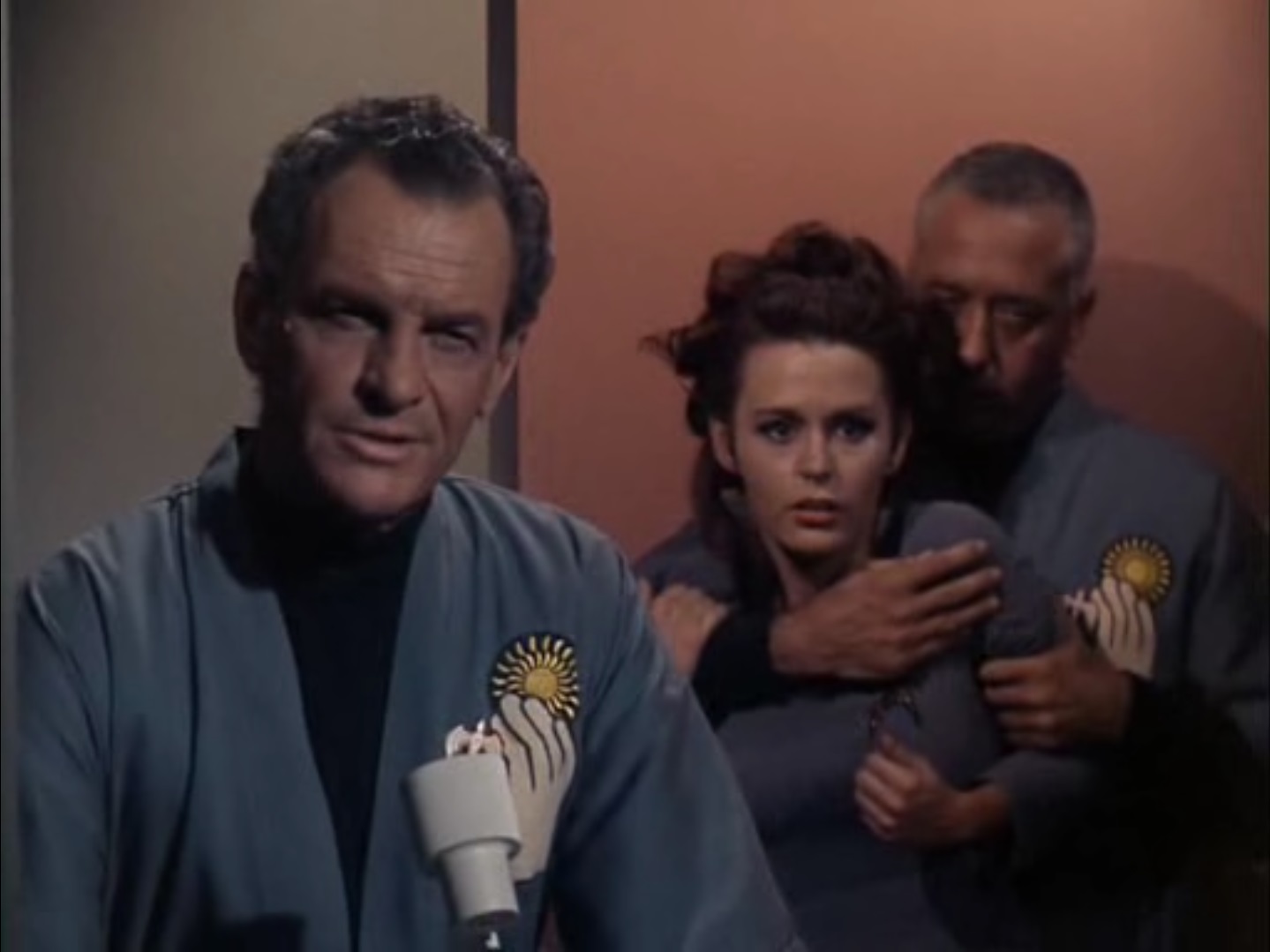
Dr. Adams, a latter-day Dr. Moniz.
These twin themes: that of a drive to help disturbed minds, while at the same time retaining an awareness of and belief in a criminal's basic personhood and right to dignity and self, paint a picture of a more humane, thoughtful world. Imperfect, yes, but with a determination to improve despite individual setbacks. As with "Miri", I find myself heartened by a vision of the future where punishment is no longer considered the first and best option for dealing with misbehaving people of any age.
Four stars.
Chemicals, by any other name

by Gideon Marcus
I don't know if this is a phenomenon unique to Star Trek, but I often find myself noting similarities between a given episode and previous ones, and to other stories in general. Lorelei pointed out that, once again, we have Kirk exploring an underground complex. Once again, the captain must treat with a megalomaniac scientist and his powerful device (q.v. "What are Little Girls Made of?").
But the biggest comparison I draw is to Norman Spinrad's recent story, Your name shall be…Darkness. In Spinrad's tale, an American officer is captured in Korea and subjected to a novel application of electroshock therapy. Bit by bit, his captor strips away all of his memories until all that is left is raw ego. Then his identity is restored, presumably with additional programming. We saw something like this in The Manchurian Candidate, too, as well as The Mind Benders, but Darkness feels like the closest fit. In Darkness, after his ordeal, the officer is compelled (perhaps by programming) to use the brainwashing technique to cure the mentally disturbed. He becomes a psychiatrist, one of the most prominent in his field. Essentially, he is Dr. Adams with his machine — but whether this is ultimately a good or a bad thing is left open. After all, we don't know what the officer's real mission is, or what he might be implanting in his patients.
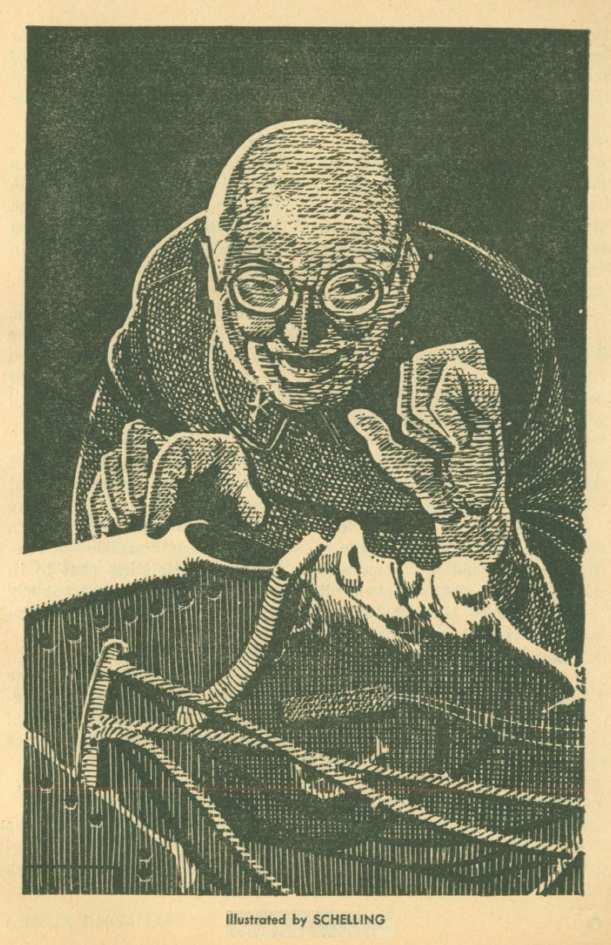
The brainwasher from "Darkness".
Dr. Noël posits that the Neural Neutralizer is a better, more permanent solution to insanity than constant injection of tranquilizers (which is the way Dr. Van Gelder is treated by McCoy). In the end, Trek teaches us that brainwashing is not the answer either.
The episode does suggest that there is an answer, however: when Spock establishes the ultimate empathy with Van Gelder, using an "ancient Vulcan technique", only then is he able to soothe the tortured mind of the doctor. We may not have Spock's psychic powers, but perhaps we can discover a similarly effective psychotherapeutic treatment for the heretofore incurably disturbed.
Who says science fiction can't be aspirational as well as cautionary?
Four stars.
Paved with Good Intentions

by Tam Phan (Secret Asian Man)
I don't know how much more I can take from the security team. Fortunately, the predictable ineptitude of the security force on the Enterprise wasn't the cause of events spiraling out of control. I'll give it a pass this time because "Dagger of the Mind" is a bit of a return to form. I've been unimpressed by the recent episodes, but I love a good moral dilemma.
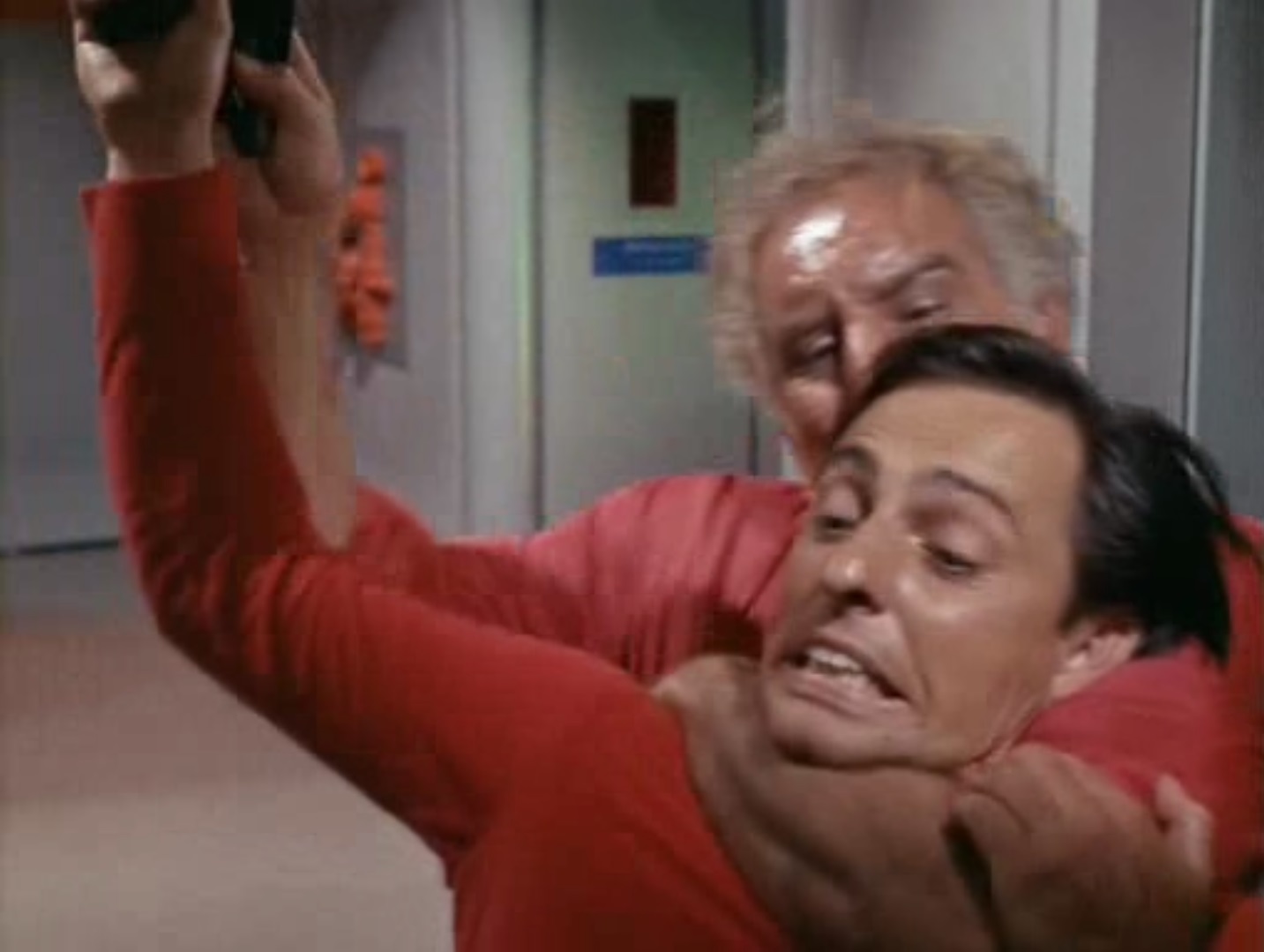
Another Tuesday aboard the Enterprise
The contrast between the affable, accommodating attitude Dr. Adams displayed, and that of his work, was eerie from the audience's perspective. We only know there's something wrong because this wouldn't be a very entertaining show if there wasn't, but Kirk's trust of Adams was only natural considering how renowned his work is. Even Dr. Noël's admiration was to be expected, and it was only McCoy's insistence of a thorough report that raised any suspicions. I wouldn't have been surprised if this operation had continued to go unnoticed indefinitely.
I hope to get more episodes like this where we are faced with the ethics of the implementation of technology in the future. How far would we have allowed Adams to turn that dial before stopping to consider how wrong it is? How far would we turn that dial if we thought we were making a positive impact? Going where no man has gone before isn't necessarily always to a physical place.

Five stars
(You don't have to wait long to see the next episode of Star Trek — join us tonight at 8:30 PM (Pacific AND Eastern — two showings)!!)
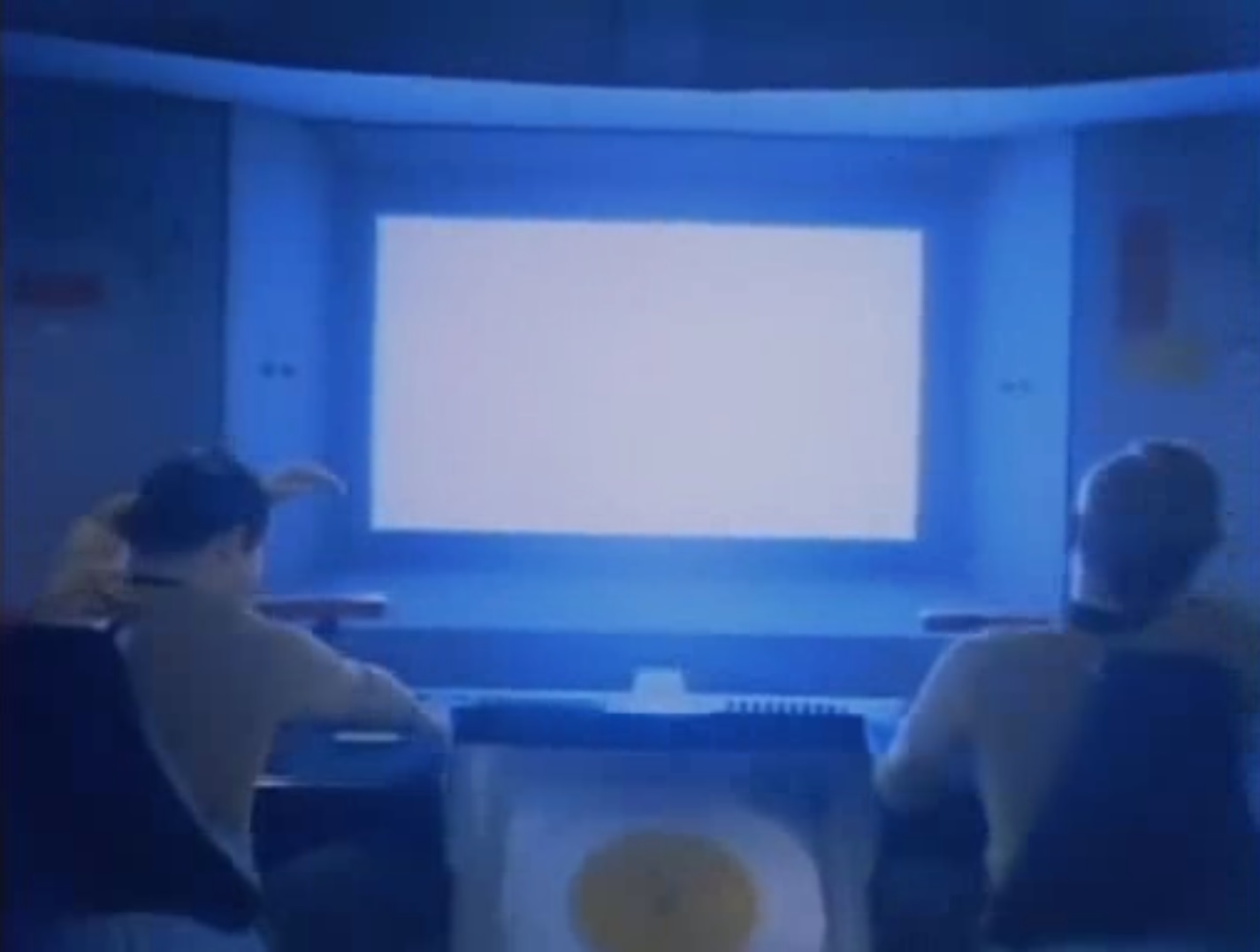

![[November 10, 1966] <i>Star Trek</i>: "Dagger of the Mind"](https://galacticjourney.org/wp-content/uploads/2021/11/661110title-672x372.jpg)

![[November 4, 1966] <i>Star Trek</i>: "Miri"](https://galacticjourney.org/wp-content/uploads/2021/10/661104title-672x372.jpg)









![[October 31, 1966] Respite from the horror (November 1966 <i>Analog Science Fiction</i>)](https://galacticjourney.org/wp-content/uploads/2021/10/661031cover-355x372.jpg)










![[October 26, 1966] <i>Star Trek</i>: "What are Little Girls Made of?")](https://galacticjourney.org/wp-content/uploads/2021/10/661026a-672x372.jpg)





















![[October 22, 1966] Why Johnny Should Read (November 1966 <i>Fantasy and Science Fiction</i>)](https://galacticjourney.org/wp-content/uploads/2021/10/661022cover-653x372.jpg)





![[Oct. 20, 1966] Crimes against Humanity (<i>Star Trek</i>: "Mudd's Women")](https://galacticjourney.org/wp-content/uploads/2021/10/661020title-672x372.jpg)









![[October 12, 1966] Inside Out (<i>Star Trek's</i> "The Enemy Within")](https://galacticjourney.org/wp-content/uploads/2021/10/661012title-672x372.jpg)

![[October 6, 1966] One Trek, neat (<i>The Naked Time</i>)](https://galacticjourney.org/wp-content/uploads/2021/10/661006title-672x372.jpg)

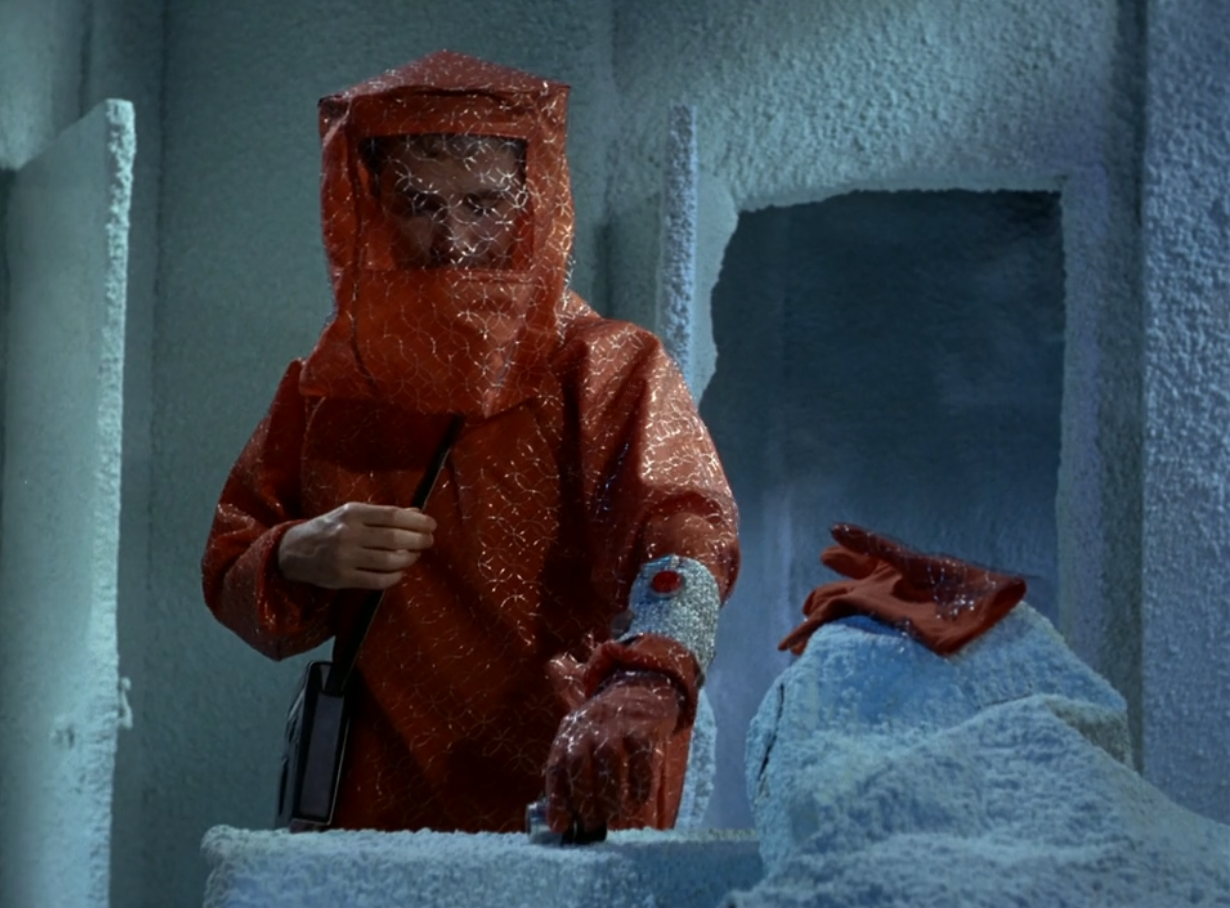
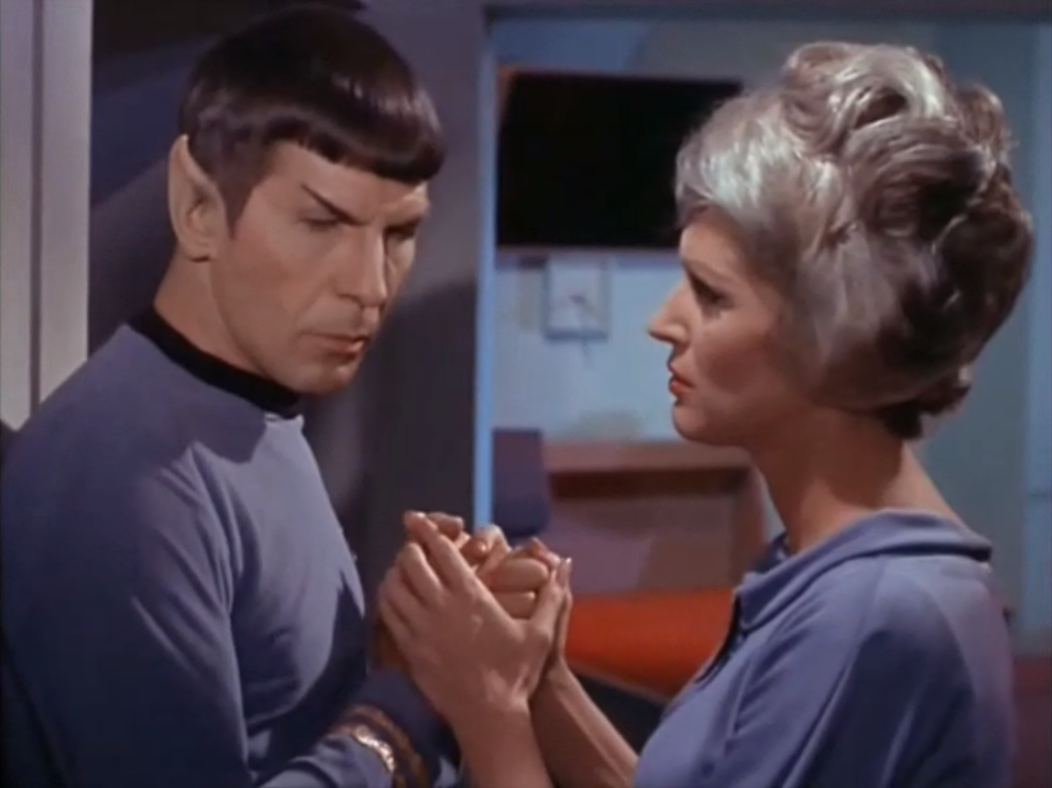
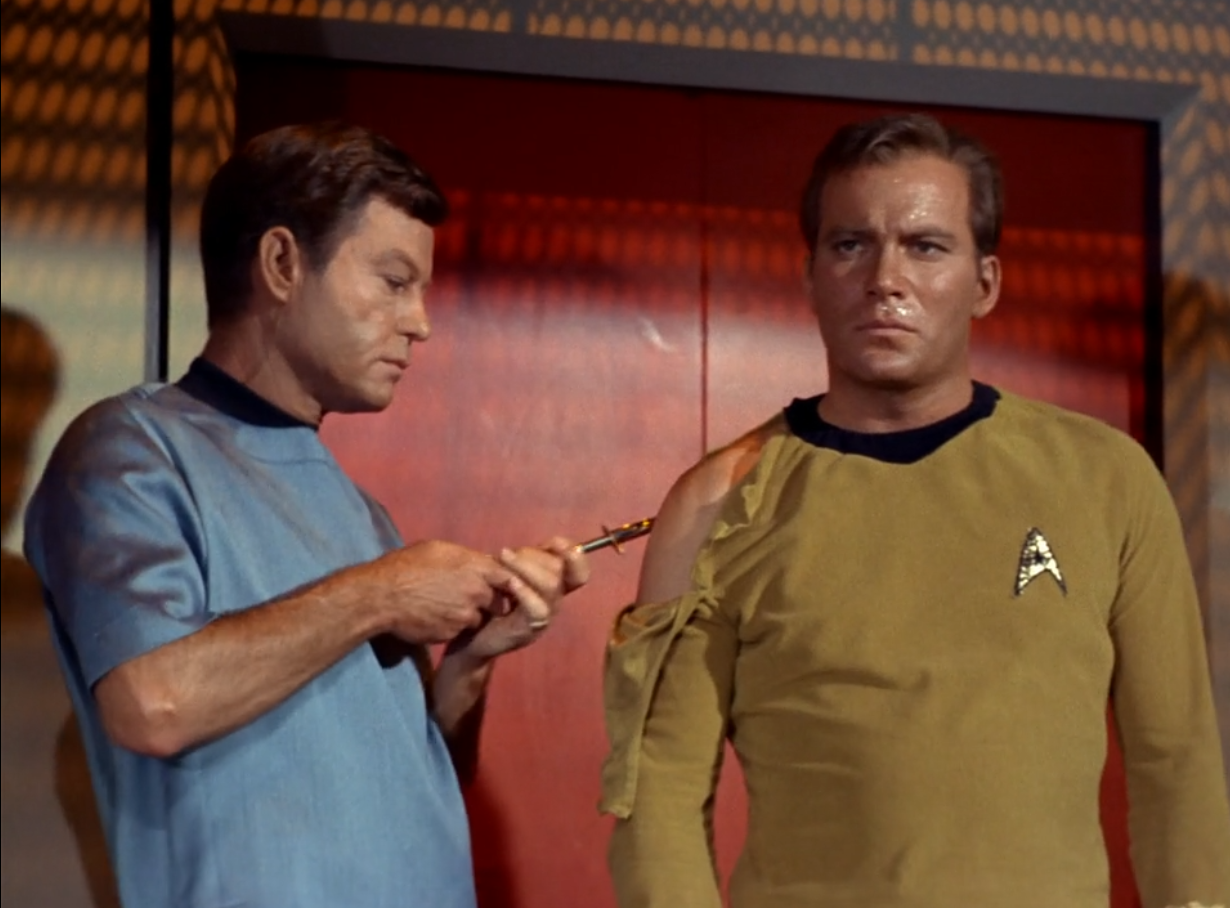






![[September 30, 1966] Return to Base (October 1966 <i>Analog</i>)](https://galacticjourney.org/wp-content/uploads/2021/09/660930cover-672x372.jpg)









![[September 22, 1966] True Idols (the Isaac Asimov issue of <i>Fantasy and Science Fiction</i>)](https://galacticjourney.org/wp-content/uploads/2021/09/660920cover-659x372.jpg)




